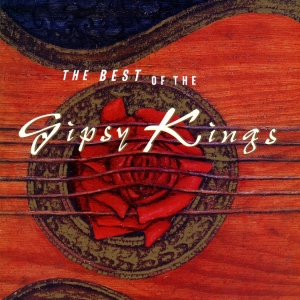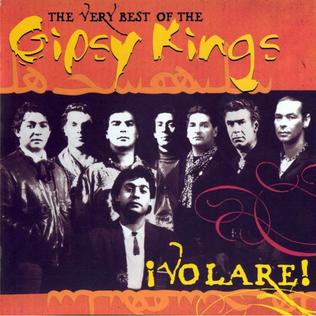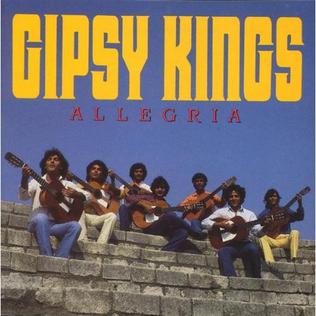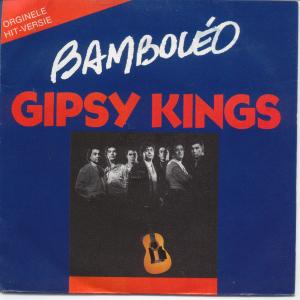
Gipsy Kings are a musical group founded in 1979 in Arles, France. The band, whose members have Catalan heritage, play a blend of Catalan rumba, flamenco, salsa, and pop. They perform mostly in Spanish but also mix in Catalan and languages of southern France, such as Occitan.

Jalloul "Chico" Bouchikhi is a French musician and a co-founder of the Gipsy Kings. After leaving the band in 1991, he formed his own group, Chico & the Gypsies.
Alegria or Alegría (Spanish) or Allegria (Italian), means joy in English. It also may refer to:

"Djobi, Djoba" is a hit song by the Gipsy Kings, a French-Calé rumba flamenca band. It was initially released in 1982 as an acoustic version on their debut album Allegria. In 1987, the song was re-recorded and released as a single. This version is from their self-titled third album. Along with other hits from the same album such as "Bamboléo" and "Un Amor", "Djobi Djoba" helped rocket the Gipsy Kings to European popularity, before they gained popularity in America in 1989.

The Best of the Gipsy Kings is an album from the band Gipsy Kings. It was released on March 28, 1995, in the US.

Gipsy Kings is the third album by the French Rumba Catalana band Gipsy Kings, which was released in 1987. The US and European versions of this album are identical except in some cases the song order may differ. The Japanese version released in 1995 includes an alternate version of "Vamos a Bailar". The song "Inspiration" from this album famously appeared in the season five episode of Miami Vice, "World of Trouble", in June 1988.

Pasajero (Traveler) is the twelfth studio album from the band Gipsy Kings. It was originally released on October 3, 2006 internationally and released in the United States on January 23, 2007. Both versions are identical.

Greatest Hits is a best of album by the French rumba catalana band Gipsy Kings, which was released in 1994 in Europe.

Compas is the ninth studio album by rumba band Gipsy Kings. It was released in 1997 in Europe and the US, using a different song order. The European version has one completely new track, "Sueño de Noche", as well as a remixed version of "Ami Wa Wa ".

Love and Liberté is the sixth studio album by Gipsy Kings released in 1993. The album was released in different US and European versions. Apart from the song order, the difference is the exclusive track "La Quiero" on the European release and versions of songs "Escucha Me" and "Campaña".

"Kalimba de Luna" is a 1982 single by Italian musician and drummer Tony Esposito. It was written by Esposito with his long-time collaborator Remo Licastro, pianist Giuseppe "Joe" Amoruso, keyboardist Mauro Malavasi and vocalist Gianluigi Di Franco. It was taken from Esposito's album Il grande esploratore. "Kalimba de Luna" was a European success and reached no. 12 in the Austrian chart, no. 6 in the Swiss charts and no. 14 in the Italian charts.

Mosaïque is the fourth studio album by the Gipsy Kings, released in 1989 in Europe and Canada. The main difference between the two versions is the replacement of the instrumental "Bossamba" on the European release with "Niña morena" on the North American release. The track order also differs between the two versions, and they contain different recordings of the songs "Caminando por la calle", "Trista pena", and "Vamos a bailar".

Volaré! The Very Best of the Gipsy Kings is a compilation album by the French Rumba Catalana band Gipsy Kings, which was released in 1999 in Europe, Japan and Mexico. The US version released in 2000 is identical with the omission of "Hitmix '99 ", which appears as track #20 on the first CD1 of the other versions.

Luna de Fuego is the second studio album by the Gipsy Kings, released in 1983 in Europe.

Este Mundo is the fifth studio album by the Gipsy Kings, released in July 1991 in US and Europe; both versions are identical. "No Volveré" was covered by Tarkan as "Vazgeçemem" on his debut album Yine Sensiz in 1992.

Allegria is a compilation album by the Gipsy Kings, released in 1990 for US audience. It is a merged album of the original Allegria album from 1982 and Luna de Fuego from 1983. The decision was also made to delete four tracks from the two European recordings, possibly to make the double recording fit onto one CD. The four songs which didn't make the cut were "Djobi Djoba", "Pharaon", "Recuerda", and "Gipsyrock".

Live is the first live album by the Gipsy Kings, released in 1992 in Europe and the US. Both versions of the release are identical. Apart from "Intro", newly released on this album are the songs "Odeon" and "Fandango".

"Bamboléo" is a 1987 Spanish language song by Gitano-French band Gipsy Kings, from their eponymous album. The song was written by band members Tonino Baliardo, Chico Bouchikhi, Nicolas Reyes and Venezuelan composer Simón Díaz. It was arranged by Dominique Perrier. "Bamboleo" could be translated as "wobble", "swing" or "dangle" in Spanish.

François Reyes, better known as Canut Reyes, is a French guitarist, singer, songwriter, and painter of Spanish Gitano descent, best known for being part of the group Gipsy Kings.

This article is the discography of French rumba flamenca band Gipsy Kings.



















